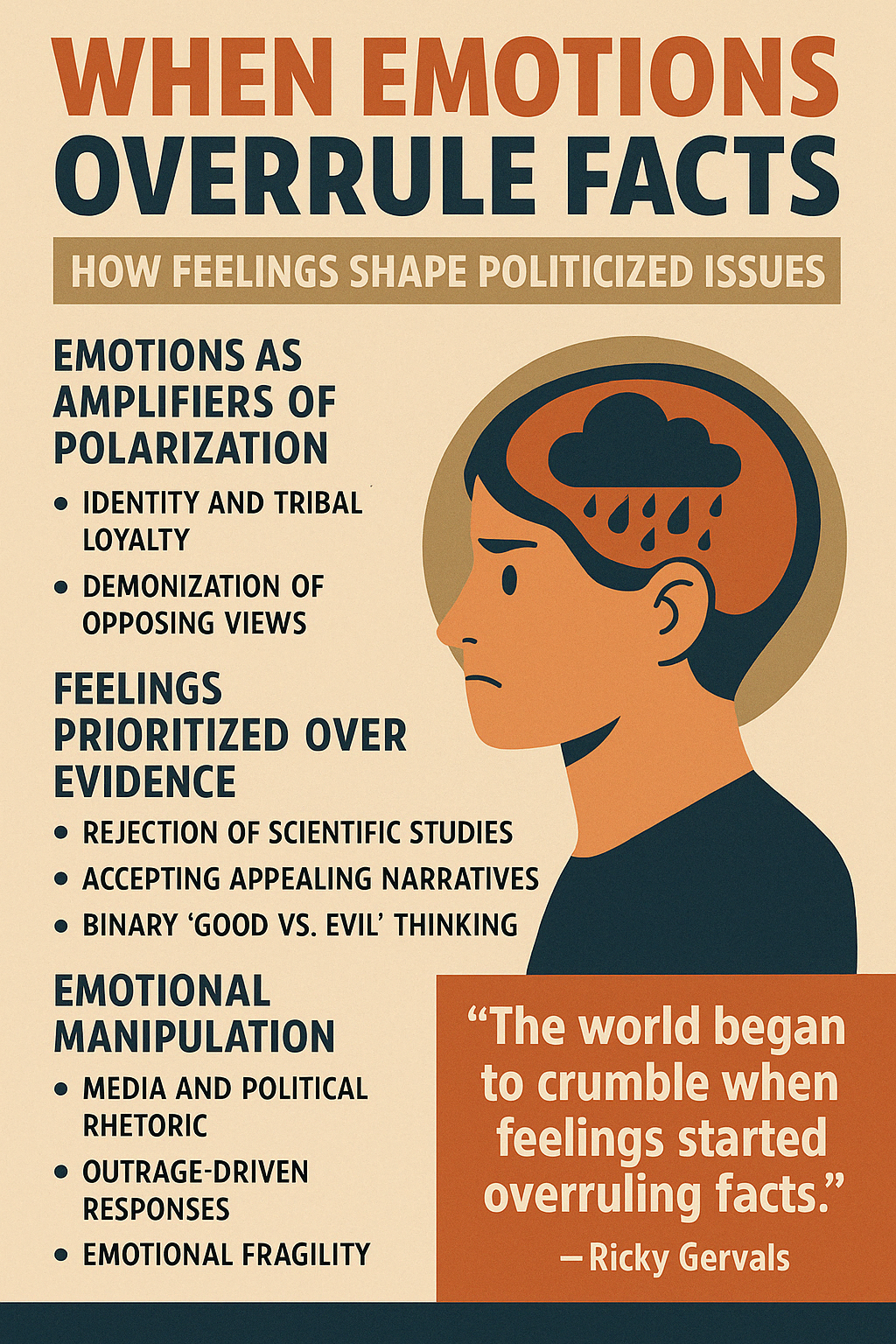“The world began to crumble when feelings started overruling facts.”
— Ricky Gervais
In today’s world, the intersection of emotions, feelings, and politicized issues has become one of the central forces shaping public discourse, policymaking, and even social relationships. As Ricky Gervais aptly observed, when feelings supersede facts, the very foundations of rational dialogue, objective inquiry, and societal stability begin to erode.
Let’s explore in detail how emotions and feelings influence politicized issues:
Emotions as Amplifiers of Polarization
When an issue becomes politicized, it taps into identity and tribal loyalty. Emotions like fear, anger, pride, or moral outrage are triggered. These emotions:
- Strengthen group bonds (us vs. them mentality)
- Heighten confirmation bias (accepting only information that supports one’s feelings)
- Demonize opposing views (perceiving dissenters as evil rather than simply wrong)
Thus, emotional loyalty to a “side” often overrides an objective assessment of facts. It’s not about what’s true; it’s about how belonging feels.
Feelings Prioritized Over Evidence
Politicized debates on topics like public health, climate change, immigration, or education often show how emotional reactions can drown out empirical evidence:
- People may reject scientific studies if they conflict with their personal values or identity.
- Narratives that feel morally superior are accepted, even if they lack factual grounding.
- Emotional slogans (“Save the children!”, “Protect our borders!”) can overpower complex, nuanced discussions.
This emotional prioritization simplifies issues into “good vs. evil” binaries, making it harder to navigate the messy reality that most problems inhabit.
The Rise of Emotional Manipulation
Politicians, corporations, and media outlets have learned that emotions drive behavior far more than rational argument:
- Fear is used to drive votes (“They are coming for your way of life!”)
- Outrage fuels clicks and ratings (“Can you believe what THEY did?”)
- Hope or nostalgia sell products and ideologies (“Make things great again!”)
The public, conditioned by media and algorithms, is increasingly emotionally reactive rather than critically reflective. This makes society vulnerable to manipulation by those who know how to push emotional buttons.
Emotional Fragility and Victimhood Culture
A consequence of feelings overruling facts is the emergence of emotional fragility:
- Disagreement is often framed as harm or violence against personal identity.
- Safe spaces and trigger warnings, initially intended for trauma survivors, have been expanded to shield people from uncomfortable facts or diverse opinions.
- Victimhood becomes a form of moral superiority, where being offended grants greater authority than reasoned debate.
In this environment, feelings of offense take precedence over the substance of truth.
Erosion of Objective Institutions
When emotions dominate:
- Judicial systems can prioritize public outrage over due process.
- Universities can suppress research that challenges prevailing emotional narratives.
- Media outlets shift from reporting news to catering to the emotional biases of their audience.
Over time, this erodes trust in institutions that depend on objectivity, reason, and due diligence.
The Psychological Dynamics Behind It
From a psychological standpoint:
- Emotions arise faster than rational thought (the amygdala hijacks before the prefrontal cortex engages).
- Feeling-based thinking is easier and less cognitively taxing than critical thinking.
- Evolutionarily, emotions helped us survive immediate dangers; rational thought evolved later for longer-term planning.
Thus, in high-stress, high-speed environments (like today’s news cycle and social media), emotional responses naturally dominate.
Solutions: Rebalancing Feelings and Facts
A healthy society doesn’t ignore emotions — emotions are vital for meaning, empathy, and motivation.
But emotions must be balanced by facts and critical thought.
Ways to restore balance:
- Emotional literacy: Teach people to recognize and regulate their feelings before reacting.
- Media literacy: Equip individuals to detect emotional manipulation tactics.
- Slow thinking: Encourage reflection, discussion, and time for deliberation.
- Valuing truth over comfort: Cultivate resilience to uncomfortable facts rather than seeking emotional anesthesia.
- Support true dialogue: Promote environments where disagreement is normalized and facts are prized.
Conclusion: Interest, Integrity, and Inner Work
Georgia O’Keeffe once said:
“Happiness is momentary—you’re happy for an instant and then you begin thinking again. What matters most is interest in life; happiness is transient, but interest is constant.”
Similarly, interest in truth must be constant, while fleeting emotional highs must not dictate collective decisions.
Emotions will always arise — they are visitors, as Rumi beautifully put it:
“Thoughts are visitors. Greet them all, but only let the noble ones stay for dinner.”
In a politicized world driven increasingly by emotional reactions, we are called to develop the wisdom to greet every feeling but dine only with truth, reason, and noble intention.
When facts once again find their place at the head of the table — not in conflict with human emotion, but in harmony with it — then, and only then, will society be able to rebuild what crumbled when feelings overruled facts.






